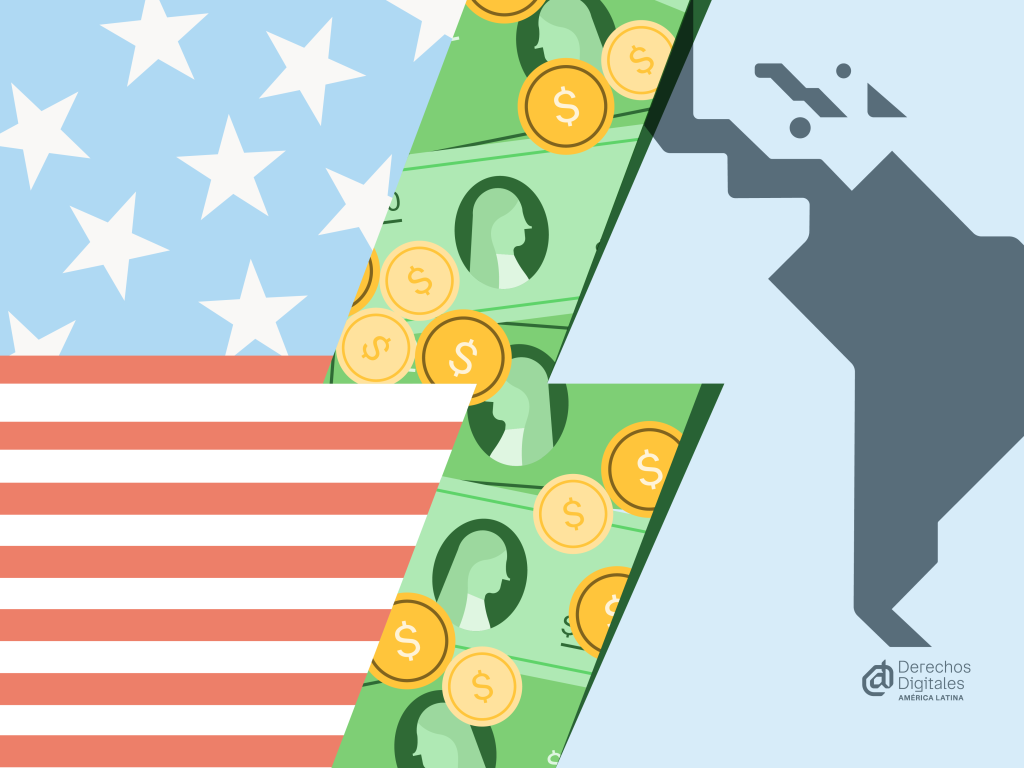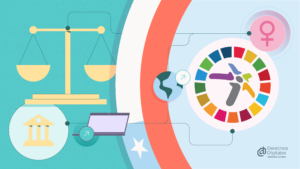Choose language:
Latin America under U.S. commercial pressure: impacts and prospects for a Human Rights–based development agenda
In recent years, a modest advance began to be observed in the consensus around the need to rebalance global power relations in the field of technology. The concept of “tech sovereignty” has gained prominence in the discourses of both governmental and international authorities. At the same time, new opportunities emerged for fiscal policies aimed at compensating countries for the extraction of their data by a handful of companies. Even though some of these demands remain largely rhetorical (with countries still granting benefits to the same companies for local resource exploitation), the alliance between Big Tech and the far-right U.S. government has devoted all its efforts to pushing them back.

It has been just over six months since Donald Trump took office at the presidency of the United States, a moment marked by the prominent presence of CEOs from the world’s leading technology companies flanking the president. Since then, there have been a number of announcements and unclear signals regarding his international and technology policies.
In the multilateral arena, U.S. diplomacy has abandoned programs focused on advancing its “freedom on the internet” agenda, known for favoring the deregulation of the sector, and has also stepped back from long-standing commitments to internet governance, blocking historic consensus on the application of Human Rights in technology. On the other hand, the Trump administration has directly incorporated Big Tech’s narrative into its trade strategy, according to which any attempt to limit their monopolistic dominance would represent a “non-tariff barrier” and, as such, a threat to U.S. national interests.
The current U.S. trade policy consolidates a growing trend of disengagement from multilateral negotiation within the World Trade Organization (WTO). By doing so, Trump avoids the need to convince a group of countries (increasingly aware of the digital agenda’s relevance to economic development) to maintain outdated customs restrictions on e-commerce, among other measures.
In the Latin American context, episodes such as the imposition of tariffs on Mexico—followed by successive negotiations in exchange for the elimination of “non-tariff trade barriers”—and the early public dispute with the Colombian president, resulting in a threat to impose new tariffs which was later revised after a bilateral agreement, set the tone for the new rules of the game. Both cases highlight opaque agreements and concessions that could have profound impacts on the human rights of their populations.
The new face of an old strategy
The current situation is marked by high levels of instability and a clear intent to favor U.S. domestic interests, with few benefits for the region. Alongside the scaling back of international cooperation policies that directly affect the Latin American population, threats of direct intervention have also emerged, not seen in a long time. However, the use of trade policies to pressure countries into adopting measures that benefit the U.S. technology industry is far from new.
The Special 301 Report, produced by the Office of the U.S. Trade Representative (USTR) and well known in digital rights activism, has been one of the main forms of pressure applied to countries in the region. The document compiles a list of countries that allegedly fail to protect the intellectual property rights of U.S. companies.
The first version of the document, published in 1989 following the legal reform that established it, included Argentina, Chile, Colombia, and Venezuela on a “watch list” for maintaining practices considered “of concern” in the area of intellectual property. Brazil and Mexico, in turn, were listed as countries whose practices warranted “special attention” but which, according to the document, would not be investigated due to progress made in recent bilateral or multilateral negotiations. Between 2005 and 2018, Argentina, Bolivia, Brazil, Chile, Colombia, Costa Rica, Ecuador, Guatemala, Mexico, Paraguay, Peru, and Venezuela have been listed in the report, either in the “watch list” or the “priority watch list”. Most remain on the lists of the 2025 edition. Uruguay was included in the 2005 report but was later removed.
The document’s title refers to Section 301 of the U.S. Trade Act of 1974, which allows the USTR to investigate trade practices deemed harmful to U.S. interests unilaterally and to adopt coercive measures to pressure countries to open their markets. Section 301 investigations can be initiated either at the USTR’s own initiative or at the request of the private sector.
The circumstances surrounding Section 301’s enactment resemble the current regional scenario. According to former Brazilian diplomat Regis Aslanian, the mechanism reflects a policy of “commercial authoritarianism” adopted by the U.S. during a period when its economy faced the risk of losing hegemony. He explains that, at that time, Brazil was seeking to consolidate its domestic industry and underwent investigations under Section 301 in 1985 and 1987 for alleged barriers to U.S. trade and investment in sectors including pharmaceuticals and technology. This milestone partly exemplifies how the relationships of technological dependence that persist to this day in the countries of the Global South were constructed.
The most recent investigation opened against Brazil under Section 301 shows that the instrument remains relevant in providing a veneer of legality to the imposition of arbitrary sanctions against countries. However, the Trump administration did not need to wait for the outcome of these investigations to begin imposing penalties on Brazil: the announcement of a 50% tariff on Brazilian products included a reference to the opening of the investigation, which took place days later and remains unresolved.
Concerning the “Special 301,” its focus has been on pressuring for the adoption of measures criminalizing “piracy,” as well as other mechanisms to prevent its circulation, such as imposing technological barriers and requiring internet service providers to hand over information, among other measures, clearly illustrated in the Latin American chapters of its latest version. These kinds of measures have been strongly promoted by the content production industry lobby over the last few decades. However, in the current scenario, they are mixed with countervailing pressure for deregulation: the current flagship cause of the U.S. technology lobby, as seen in the investigation against Brazil.
A game with few winners
The pressure exerted on the sovereignty of Latin American states reveals the power imbalance in negotiations, where countries are expected to make concessions simply to preserve the status quo. This situation is not unique to Latin America: in Europe, where various technology regulation policies have been at the center of the dispute, the outcome of the negotiations is unclear regarding their implications for the future of European regulatory frameworks on the issue. Moreover, an official White House statement lists among the agreements, the termination of European discussions on the taxation of large digital platforms (commonly referred to as “network fees”), the intention to review “unjustified barriers to digital trade,” and a commitment to maintain zero customs duties on electronic transmissions.
However, some countries are in a stronger position to negotiate. Brazil is one such case, but also an example of a situation in which one of the demands left no viable alternative: the imposition of 50% tariffs was accompanied by a demand for interference in the judiciary’s autonomy, an action impossible for any government even minimally committed to democracy. The country’s advantage lies in its relatively independent international trade, with only 12% of its gross domestic product reliant on the United States. Still, the tariffs in place since August 6th have had a significant impact on specific economic sectors, keeping the government interested in returning to the negotiating table, and open to discuss measures related to the technology industry.
Although it appeared more subtly in Trump’s initial communication, which referred to “ongoing attacks on the digital business activities of U.S. companies”, the pressure on Brazil’s stance toward technology regulation is clearly reflected in the investigation opened under Section 301.
Both actions followed the country’s Supreme Court ruling in the long-standing case about the intermediary liability regime established by the Civil Rights Framework for the Internet, which concluded that it is partially unconstitutional. While the decision seeks to establish a differentiated liability regime, it has created greater legal uncertainty for companies. Technology companies are calling for a review of this decision and for tax incentives to set up data centers in the country.
Between resistance and the construction of alternatives
The harmful impact of Trump’s foreign policy is evident and will persist for many years. In Latin America, it has the potential to undermine the sustainability of already fragile economies and leave the social sectors most in need of support unprotected. Not to mention the potential setback in development, which is essential to overcoming persistent inequalities, both locally and globally. China’s potential to fill the void left by the U.S. in terms of investment and wealth generation is certainly a source of encouragement for governments in the region. The country has also sought to project its influence in multilateral arenas discredited by U.S. diplomacy. However, doubts remain about its genuine commitment to a human rights–based agenda.
Relying solely on a shift towards China as a force capable of rebalancing international relations would be a mistake. Countries in the region must seize the opportunity without replicating a new model of dependency. While urgency may require economic and developmental counterweights, if international support, whether from China or Europe, is not accompanied by a genuine commitment to defending rights, we would merely be exchanging one set of exploiters for another.
In this regard, strengthening the technological agenda within groups such as the G20 and BRICS may offer an opportunity to uphold existing commitments to justice and human rights, including in the technology sphere. The recent declaration by BRICS leaders on artificial intelligence shows that there is still room for a development perspective based on the guarantee of fundamental rights. It now remains to be seen how these commitments will be implemented in the current discussions and how these countries can withstand pressure from Trump, who seems to have them in his sights.





































